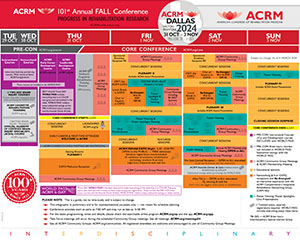Cardiopulmonary Rehabilitation
Aging Research & Geriatric Rehabilitation
Clinical Practice
Occupational Therapy Within an Outpatient Cardiac Program: Development and Outcome Study
Saturday, November 2, 2024
2:30 PM - 2:45 PM
Location: Station 14: ROOM: POSTERLAND / Trinity Poster / Exhibit Hall REGION: Tower Lobby Level >>>

Jacob P. Lindsey, OTR/L
Occupational Therapist
NYC-HHC: Bellevue
Jersey City, New Jersey, United States
Presenting Author(s)
Research Objectives: To assess the feasibility and functional outcomes of a Cardiac Wellness Program in an outpatient setting.
Design: The initial program design was based within the Person, Environment, Occupation, and Performance Model with additional design supplementation from the OT Wellness Model and social work Psycho-Education Model. Patients referred from the Outpatient Cardiac Exercise program were were assessed using the Canadian Occupational Performance Measure, Cognitive Performance Test: Medication Subtest, and the Activity Card Sort. Patients underwent a 4 week program consisting of 2 individual sessions (evaluation and discharge), and 5 group classes that provided education and training on a variety of subjects surrounding cardiac symptoms, wellness education, medication routine, family relationships, socialization, and occupational engagement.
Setting: Outpatient - large, general metropolitan area
Participants: 14 patients (50% male, 50% female) participated across five cohorts between September 2023 and March 2024. Referrals were made on an ad hoc basis by the Cardiac NP.
Interventions: Patients underwent a 4 week program consisting of 2 individual sessions (evaluation and discharge), and 5 group classes (capped at 4 persons each cohort) that provided education and training on a variety of subjects surrounding cardiac symptoms, wellness education, medication routine, family relationships, socialization, and occupational engagement. Therapist to patient ratio was capped at 1:4. Sessions and classes varied in duration based on course material and lateness to group appointments, but ranged from 30 min to 3 hours.
Main Outcome Measures: Canadian Occupational Performance Measure, Cognitive Performance Test: Medication Subtest, and the Activity Card Sort.
Results: OT program material and interventions had to be immediately readjusted in the first cohort due to timing between initial diagnosis/hospitalization to presentation to Cardiac OT program (greater than or equal to 6 months). Prior to treatment patients demonstrated deficits in cognition, reduced occupational engagement, and deficits in functional performance. At the completion of the four week program patients reported improved functional performance in self-selected occupations. The program generated referrals to six different specialty services.
Conclusions: The Outpatient OT Cardiac Wellness program is beneficial and cost effective, but OT in cardiac outpatient care is underutilized and under researched. This Wellness focused program offers holistic treatment and comprehensive treatment aimed at improving functional outcomes while simultaneously improving patient and family ability to manage chronic cardiac conditions.
Author(s) Disclosures: I was instrumental in creating this program but have no conflicts of interest or other disclosures.
Design: The initial program design was based within the Person, Environment, Occupation, and Performance Model with additional design supplementation from the OT Wellness Model and social work Psycho-Education Model. Patients referred from the Outpatient Cardiac Exercise program were were assessed using the Canadian Occupational Performance Measure, Cognitive Performance Test: Medication Subtest, and the Activity Card Sort. Patients underwent a 4 week program consisting of 2 individual sessions (evaluation and discharge), and 5 group classes that provided education and training on a variety of subjects surrounding cardiac symptoms, wellness education, medication routine, family relationships, socialization, and occupational engagement.
Setting: Outpatient - large, general metropolitan area
Participants: 14 patients (50% male, 50% female) participated across five cohorts between September 2023 and March 2024. Referrals were made on an ad hoc basis by the Cardiac NP.
Interventions: Patients underwent a 4 week program consisting of 2 individual sessions (evaluation and discharge), and 5 group classes (capped at 4 persons each cohort) that provided education and training on a variety of subjects surrounding cardiac symptoms, wellness education, medication routine, family relationships, socialization, and occupational engagement. Therapist to patient ratio was capped at 1:4. Sessions and classes varied in duration based on course material and lateness to group appointments, but ranged from 30 min to 3 hours.
Main Outcome Measures: Canadian Occupational Performance Measure, Cognitive Performance Test: Medication Subtest, and the Activity Card Sort.
Results: OT program material and interventions had to be immediately readjusted in the first cohort due to timing between initial diagnosis/hospitalization to presentation to Cardiac OT program (greater than or equal to 6 months). Prior to treatment patients demonstrated deficits in cognition, reduced occupational engagement, and deficits in functional performance. At the completion of the four week program patients reported improved functional performance in self-selected occupations. The program generated referrals to six different specialty services.
Conclusions: The Outpatient OT Cardiac Wellness program is beneficial and cost effective, but OT in cardiac outpatient care is underutilized and under researched. This Wellness focused program offers holistic treatment and comprehensive treatment aimed at improving functional outcomes while simultaneously improving patient and family ability to manage chronic cardiac conditions.
Author(s) Disclosures: I was instrumental in creating this program but have no conflicts of interest or other disclosures.
Learning Objectives:
- Upon completion, participant will be able to understand essential Cardiac Wellness Program concepts and components.
- Upon completion, participant will be able anticipate and avoid barriers to implementing a Cardiac Wellness Program into practice.
- Upon completion, participant will be able to identify the complex personal, environmental, and occupational needs of cardiac clients in the outpatient setting.

.jpg)
.jpg)
.jpg)
